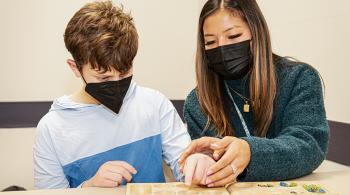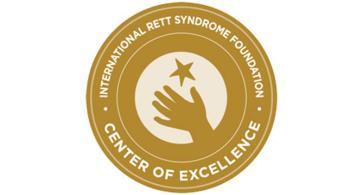The FMR1 and Related Conditions Clinic at Kennedy Krieger Institute is an interdisciplinary program that provides comprehensive evaluation and treatment services for children and adults with FMR1-associated disorders such as fragile X syndrome (FXS), fragile X-associated tremor/ataxia syndrome (FXTAS), fragile X-associated primary ovarian insufficiency (FXPOI) and fragile X-associated neuropsychiatric disorders (FXAND).
Kennedy Krieger’s FMR1 and Related Disorders Clinic is a founding member of the Fragile X Clinical and Research Consortium (FXCRC), which formed in 2006.
Who We Serve:
We serve children, adolescents and adults with FMR1 mutations, primarily those with either the full mutation or a premutation in the X-linked FMR1 gene. The diagnosis of a child with FXS often leads to the identification of family members (e.g., parents, grandparents, aunts, uncles and cousins) with changes in the FMR1 gene, which may place females at risk for FXPOI (with one of the symptoms being early menopause), commonly associated neuropsychiatric diagnoses (with symptoms that may include anxiety and depression) and/or the adult-onset neurodegenerative disorder FXTAS (with symptoms including tremors and a decline in walking).
FXS is associated with a range of neurocognitive impairments, from mild learning disabilities in females to mild-to-moderate—and at times severe—intellectual disability in males. The syndrome is also characterized by a range of neurodevelopmental challenges, including global developmental delay manifesting with motor delays, speech-language delays, autism spectrum disorder, attention difficulties, shyness, social anxiety, seizures, sleep difficulties and sensory processing difficulties. Physical characteristics such as low muscle tone, frequent ear infections and flat feet are also common.
Our Team:
Our interdisciplinary team comprises clinicians from a variety of specialties with expertise in the management of the unique medical, behavioral and educational needs of patients with FMR1-associated disorders. These specialties include:
- Neurodevelopmental medicine
- Genetic counseling
- Neuropsychiatry
- Clinical social work
- Speech-language pathology
- Neuropsychology
Our Approach:
We take an individualized approach to patient care. Each of our patients is seen at their initial appointment by specialists from neurodevelopmental medicine, genetic counseling, neuropsychiatry and clinical social work. We schedule appointments for neuropsychology testing, speech-language therapy, physical therapy, occupational therapy, behavioral psychology and other disciplines based on clinical need. We also provide medication management, if needed. In addition, we work collaboratively with relevant clinics at The Johns
Hopkins Hospital (e.g., Ataxia Clinic, ophthalmology, gynecology) and throughout Kennedy Krieger.
Testimonial:
We are so fortunate to have this clinic so close to our home. So many doctors don’t have a great understanding about fragile X. Here, we have an entire team that is very familiar with this disorder.” – Marla Gruzin, parent










